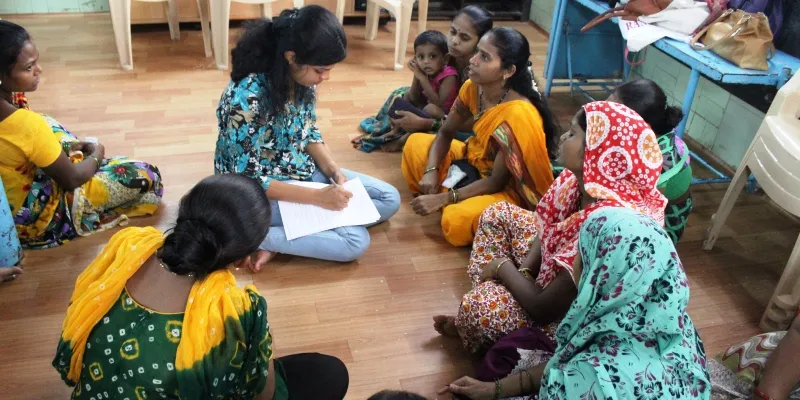How Dost Education is empowering low-income parents to promote early childhood development at home
Dost Education, a non-profit organisation, develops and delivers pre-recorded audio curriculum to prepare parents of any literacy level to take charge of their child’s early education.

Inadequate learning opportunities hampering the holistic development of children is a major consequence of the poverty in the developing world.
According to Lancet report (2007), more than 200 million children in the developing countries are at a risk of not reaching their full potential due to insufficient awareness regarding the importance of brain development in the early years of life.
Low‐income parents are motivated to give their children the best education, but struggle to do so. Their children enter primary school later and do not get a chance to catch up with their wealthy peers.
The scale of the problem is enormous, especially in India, where there are still 150 million illiterate women who become mothers and only half of the children, while in Class V, have the reading skills for Class II.
To break this cycle of illiteracy, Sindhuja Jeyabal (30) and Sneha Sheth (32) founded Dost Education in 2018, a non-profit organisation that follows a cost-effective approach to deliver technology-driven learning solutions to parents from low-income group which help in the overall development of their children.

“By putting parents at the centre of early childhood development, our vision is that every child is ready to thrive – regardless of their family’s wealth. The idea is to be a Dost to parents and enable them to make learning for their kids easier,” says Sneha
Passion for equal access to education
Graduates from UC Berkeley, Sindhuja and Sneha met at the university where both of them expressed their desire to build technology solutions to improve access to holistic education, especially for those less privileged.
Before pursuing a master’s degree in Information Management and Systems from UC Berkeley, Sindhuja had built education technology products for Adobe Systems and Samsung Electronics. Taking inspiration from her father, who is a first-generation learner in their family, she is keen on building learning solutions that can support millions of parents of the first-generation school-goers, hailing from different socio-economic backgrounds.
Sneha, who is an MBA graduate from UC Berkeley, is passionate about using her entrepreneurship skills to solve educational inequity in the world. Previously, she has successfully designed programmes for women’s empowerment and education across the world, including Mumbai, Cairo and Nairobi and was also recognised as an Education Pioneers Fellow and Berkeley-Haas Dean’s Seed Fund grantee.

Making them ready for school through phone calls
The pilot programme called ‘Dost Ki Pathshala’ helps parents of any literacy level improve their child’s learning outcomes through a pre-recorded audio curriculum.
Through four phone calls a week, the programme aims to improve their child’s early cognitive development and school readiness by focussing on socio-emotional skills, academic intelligence, and other practical information necessary for the parents.
Focussing on different topics every week like fostering healthy eating, strategies to handle aggression, developing patience through fun games, basic math concepts, they are providing actionable ideas to tackle issues that parents face on a day-to-day basis.
Recognised by Unitus Seed Fund as a top three Edtech startup in 2016, Dost Education’s objective is to ensure that the parents of the first-generation school-goers understand what is necessary for the holistic development of their child, thereby reducing the rate of dropouts from schools due to lack of competency.
The 24-week programme is made for parents with kids aged from two to six years and helps them turn their everyday moments into moments of learning and growth.

“Our users are typically mothers who have a high school education or less and have household earning of Rs 300-600 a day. They tell us that Dost serves as a daily reminder and an idea bank on how to engage with their children for educational activities. We rigorously track parents’ engagement level, knowledge retention, and behaviour change during our programme,” explains Sindhuja
With the help of Dost Education, these women have seen successful outcomes. They were able to relate with other mothers, discuss their problems, and find a solution that was simple and achievable, helping them to make their kids more responsive.
"My son used to trouble me a lot when I was trying to get work done. Now, with help of activities suggested by Dost, I keep him busy with educational activities in the kitchen. I’ve learnt a lot of new things too, which makes me happy,” says Simmi, a beneficiary from Bhajanpura, Delhi
The on-ground network of Dost Champions (volunteers), regular follow-ups and strategic partnerships with schools and non-profit organisations, help them reach the parents, facilitate the process and achieve the defined goal.
“Both non-profits and the schools find it very difficult to continuously engage with the parents because of parents' busy schedules. Dost's programme complements their activities and maintains that constant connection to strengthen the relationship between the organisations and the parents while working towards amplifying the development of the child,” explains Sneha
Growing from 300 users in February 2017 to more than 10,000 users in less than a year, Dost Education is currently working in parts of urban India where accessibility to mobile phones is high, however the aim is to take its programme to rural India where the need for early childhood education and development is urgent and paramount.
At present, its programme is live in Hindi with most users in around Delhi and a few users in pockets around Bhopal and Dharavi, Mumbai. For 2018, the organisation is working with partners to expand in Kannada, Tamil, and vernaculars.
“Our next milestones are to reach 1,00,000 parents by the end of 2017 and to turn 50 lakh underprivileged homes into early learning labs by the end of 2020,” says Sindhuja
Absence of adequate childcare and education in the early years exacerbate the poor outcomes for children who are caught up in the cycle of illiteracy and poverty. The home environment, including parent-child interactions, and the ability of parents to deal with their children, influences the cognitive and socio-emotional development of children.
Supported by donations from Y Combinator, the Mulago Foundation and UC Berkeley, the team at Dost Education with its vision and mission to provide easy child care and education assistance to families free-of-cost is dedicated to provide effective results and help in the empowerment of parents and the generations to come.







